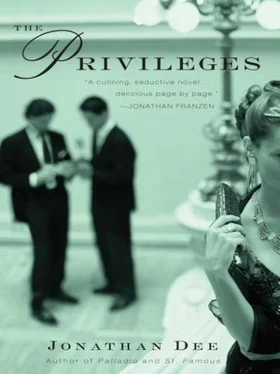Robin wasn’t back at Dalton in the fall, but the dean of the upper school said he was still hopeful she’d be back in January. April threw out Neil’s cell number, and never went back into those chat rooms again, though it was not exactly reassuring to know that he was very likely still out there somewhere himself, calling out her real name.
Dalton had a fathers’ basketball league that Adam still played in a couple of times a month. It wasn’t your standard pickup game. You could tell which ones were the lawyers from the way they stopped the game for two minutes to argue every time somebody called a foul. And some of them, the financial guys especially, were competitive to the point where you’d be breaking up fights once in a while — not often, but often enough that years ago they’d voted not to let faculty members play, because the idea of losing your temper and throwing an elbow at your kid’s history teacher was a little too fraught. The level of competition was obviously spotty, but there were some decent athletes in there. And as his own kids grew older and the fathers of new kindergartners joined the league, Adam even found himself on occasion guarded by guys who were actually his age. One night he went up for a rebound and got knocked off balance by someone’s shoulder against his hip, and as he landed on one foot he could feel his knee come apart. He remembered standing up again, his arms over the shoulders of two of his teammates, and watching the lower half of his right leg swing from side to side like a pendulum. After three days in the hospital and a week working while bedridden at home, he made his return to Perini on crutches, locked into a kind of massive splint that ran from his ankle almost to his hip and kept his right leg as straight as a pencil at all times.
They mocked him about it relentlessly at the office, hiding his crutches, making pirate noises when he stumped by, emailing him videos of famous sports knee blowouts. It was a survival-of-the-fittest kind of humor, where they laughed at his weakness more or less in lieu of killing and eating him, but he didn’t mind it, he would have expected no less. His great fear in the months that followed was getting fat. He set his recovery back a couple of weeks, or so his doctor told him, by trying to double up on the exercises his physical therapist had given him.
The analysts in the office were almost all guys in their twenties, and though they loved hanging out with Adam and were in awe of his excellence at what he did — he saw a company’s future almost instantly, an instinct that his lack of a business school degree elevated to the level of the mystical and heroic — they couldn’t figure out what he was still doing there. Over and over they would sidle up to him, usually in some bar, and let him know that when the time came for him to bolt Perini and start his own fund, he could count on their total loyalty. To a man they felt that Sanford was too risk-averse and that if it weren’t for Adam’s presence there, his clients’ money wouldn’t be doing much better than it would in a savings account.
“Someday it will be the right time,” was Adam’s usual line. “I won’t forget we talked.”
The truth was that leaving and starting his own shop would bring into play questions of proprietary information, and other forms of unwelcome attention. Part of what insulated him from suspicion is that he himself never appeared, to anyone outside Perini at least, to be the one making the decisions. No one looking at the books would have any way of knowing that Barry, at this point, did literally everything that Adam advised him to. Adam didn’t want anyone looking too hard at some of the deals he’d been involved in over the last eight or ten years, because while they might not have known exactly what they were looking for, there was always a chance they would find it anyway. From his point of view the most promising scenario was for things to stay just as they were.
Perini was still at the same address, the same layout as ever. Sanford came in less and less but talked to Adam four or five times a day wherever he was. Adam had his own office but the rest of them worked in a kind of open-floor plan and he spent most of his time out there anyway. He hadn’t been beaten on the office foosball table in four years.
Usually if Sanford wanted to make a big personal display about something, he took you out to lunch. But one morning in February, just about the time Adam was walking normally again, a few weeks after the removal of the accursed splint, the boss came in at ten — early, by his standards — called Adam into his office behind him, and told him that he had decided to retire, effective in two weeks, and to turn his executive partnership position in Perini Capital, minus only some deferred compensation, over to Adam.
“It’s largely a tax thing,” the old man said. “I had to redraw my will and there are certain things they advised me to make clear.” But his eyes were watering when he said it.
Adam was profoundly unprepared. He never saw it coming; for all the old man’s sentimentality, Adam never imagined he’d let go voluntarily of anything truly estimable without dying first.
“Barry,” he said. “You don’t need to do this now.”
“What should I wait for?” Sanford said. “You have to look forward. This is a beautiful institution and I want it to continue.”
“Don’t you — I mean, I know you have children of your own?”
“They’ll be provided for,” he said, “according to their merits. This is a separate thing.”
Adam fought down an alien panic. “This place could never exist without you,” he said. “It’s a monument to you.”
“Well, that does remind me, there is one condition to all this, and that is that the fund keeps its name. Even after I’m gone. One does want to leave a legacy, you know. One does want to be remembered. Why that should make a damn bit of difference I’m not really sure, but it does. Anyway, that will be a provision of the ten thousand things we will both have to sign.”
Adam wound up saying that it was something he would need to talk over with his wife. Sanford took that to mean that he was too moved to say yes on the spot and decorously granted his request. Adam went home that night and in the margins of a newspaper added up all the money he had offshore. It was rare for him to write anything down; he kept accounts in his head. There was enough for them to live on for the rest of their lives; but what did that even mean? It was unsettling to think of money in terms other than those of growth, of how it might be used to make more money. Something about it smelled of death to him but he didn’t know why.
He went in the next day and told Sanford that he was going to decline the offer. He felt it was premature, he said, because Sanford was still a titan in the world of private equity and would be for years to come; anyway, Perini Capital was literally unthinkable without its founder at the helm and he was sure everyone else in the office would say the same thing. Then he said he was going to use a week of vacation time. It didn’t take even an hour for Sanford’s hurt and astonishment to turn into anger. It was a strangely joyous sort of anger, though, as if he’d found out that his doctors had made some terrible diagnostic error and in fact he was going to live forever. He stormed out without a word to anyone at about three o’clock and when the others turned to Adam to ask what the fuck was going on between the two of them, he said, in a tone that terrified them, that it was nothing for them to worry about.
He probably should have gone to Anguilla right away, but instead, that night at dinner, he told Jonas and April that he was taking them out of school for a week so they could all go to London. They looked at him like he was nuts, as did Cynthia, but they had always been raised to respect spontaneity and it was much too good an offer to turn down. On short notice, in the high season, everything was outrageously expensive, but even though they kept referring to that, it didn’t really mean anything to them. They found a place in Mayfair and when April found out a former school friend of hers was on a modeling job in Surrey, Adam took them all to Battersea and chartered a helicopter to take them out there for a visit.
Читать дальше












